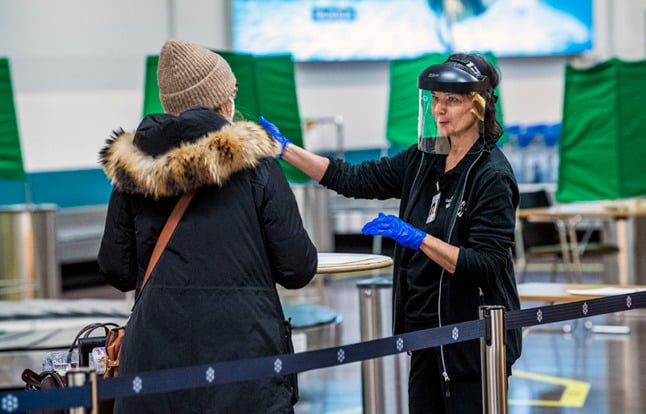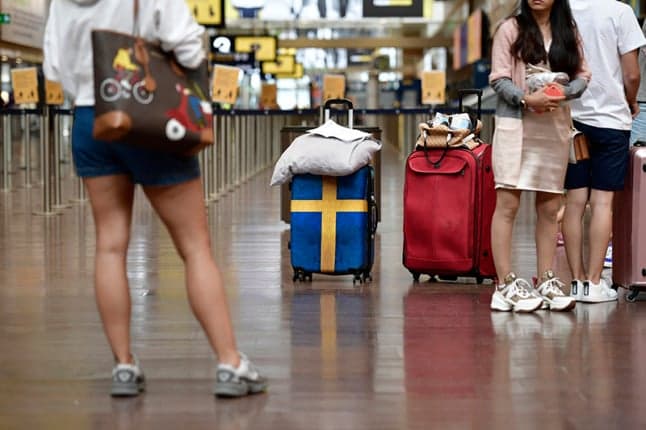If you're travelling from another Nordic country:
If you are travelling to Sweden from Denmark, Finland, Iceland or Norway, there are no entry restrictions in place.
That means you can travel for any reason, without needing to show a negative Covid-19 test or proof of vaccination, regardless of your country of nationality or citizenship. Of course, there are other reasons to limit travel during the pandemic, so it is still a good idea to choose modes of transport that limit the number of new contacts you make, and to take other measures to reduce your risk of catching and exposing others to Covid-19. You should avoid travelling anywhere if you have symptoms.
If you're travelling from another EU/EEA country:
If you are travelling to Sweden from another country in the EU or EEA, then you can travel to Sweden for any purpose (including tourism or visiting family or friends) regardless of your citizenship. You'll need to show one of the following: an EU Covid certificate or equivalent document that shows proof of vaccination against Covid-19 (a vaccine certificate), a negative test result taken within 72 hours from the time of border crossing, or proof of recovery from Covid-19 (a recovery certificate).
This requirement is in place until at least August 31st. You can find out more about the EU Digital Covid Certificate here.
Some people are exempted from the test requirement, including Swedish citizens and residents, or those travelling for urgent family reasons, like a funeral, or vital work.
The certificate should be in the official language of the issuing country and English and should be issued in an EU country or one of the exempted countries. The vaccine needs to be one of those approved by the EU Medicines Agency (EMA) and two weeks need to have passed since your first dose before you can use a vaccine certificate rather than a negative Covid-19 test to enter Sweden, according to the Swedish police.
If you're travelling from outside the EU/EEA:
There is currently a ban in place on travel to Sweden from most non-EU countries (this includes the UK). People travelling from certain countries, decided at the EU level, are exempt. As of July 26th, these include Albania, Armenia, Australia, Azerbaijan, Bosnia and Herzegovina, Brunei Darussalam, Canada, Hong Kong, Israel, Japan, Jordan, Kosovo, Lebanon, Macao, Montenegro, North Macedonia, New Zealand, Qatar, Republic of Moldova, Saudi Arabia, Serbia, Singapore, South Korea, Taiwan, Ukraine or the US.
There are several other exceptions to the rule, so you may travel to Sweden from non-EU/EEA countries not on the exempt list if you are a Swedish or EU/EEA citizen, if you live in Sweden, or if you are travelling for certain purposes including urgent family reasons and vital work. The exemptions are listed on the Swedish Police website.
In addition to belonging to one of the exempted categories, you also need to show a negative Covid-19 test no older than 48 hours (measured from the time you cross the border). The Justice Ministry confirmed to The Local that people travelling from outside the EU/EEA will not be able to show proof of vaccination as an alternative to a negative Covid-19 test.
Some people are exempted from the test requirement, including Swedish citizens and people who live in Sweden, but further recommendations about testing and isolating on arrival may apply to you regardless of your citizenship and residence status (see below).
Who should test and isolate?
The regulations above are legally binding rules that control who is allowed to enter Sweden. The Public Health Agency has in addition released a set of guidelines about whether or not you are advised to get tested and self-isolate after you arrive in the country.
If you arrive in Sweden from a country that is not exempt (i.e. a country outside the EU/EEA which is not on the EU's exempt list of third countries), the Public Health Agency urges you to get a Covid-19 test as soon as possible after arriving, preferably on the day of your arrival, if you did not get a test before departure, which is often a requirement for entry. Tests are available on arrival at Stockholm's Arlanda airport, and you can also call the 1177 healthcare helpline to find out more information about booking a test (they are free for returning travellers)
You should also take a second test five days after arrival, and self-isolate and avoid contact with other people for seven days after arriving. That means not going to shops, work or using public transport, and not meeting friends or having people visit you at home.
People who are fully vaccinated against Covid-19, using a vaccine that has been approved for use in the EU (AstraZeneca, Johnson & Johnson, Moderna and Pfizer) and having received the second dose at least two weeks before arrival in Sweden, still need to provide a negative Covid-19 test result on entry but are exempt from the recommendation to get tested and self-isolate even if they travel to Sweden from a non-exempt country (although they also need to be covered by an exemption to the travel ban in order to enter Sweden).
If you arrive in Sweden from a country that is not in the Nordics but in the EU/EEA, or a country that is on the EU's exempt list of third countries, the Public Health Agency urges you to get a Covid-19 test as soon as possible after arriving. You don't have to take the second test on the fifth day, and you don't have to self-isolate completely, although you should be "careful" about who you meet, avoid meeting risk groups, keep a physical distance to other people and pay special attention to possible symptoms.
If you have been travelling within the EU and received your first dose at least three weeks before arriving in Sweden or had Covid-19 in the past six months, you are exempt from the recommendation. You should however get a coronavirus PCR test if you develop symptoms.
If you arrive in Sweden from a Nordic country (Denmark, Norway, Finland, Iceland), you don't have to get a test or self-isolate.
However, it is important to note that even if you are exempt from the requirements to get tested and isolate, you must still follow the recommendations that apply in Sweden to curb the spread of Covid-19, whether you live here or are visiting and whether you are vaccinated or not. Those include for example limiting contact only to your closest circle, working from home if you can, avoiding use of public transport as much as possible, and staying at home if you experience symptoms consistent with Covid-19.

Where can I find out more?
All information was correct at the time of publication, but the situation can change at short notice. You can check the “Updated” time in the top left corner of the article to see when we updated this webpage. The Local recommends that before any travel, you check Sweden’s national authorities for information on the latest restrictions and exemptions:
- Public Health Agency guidelines on testing and isolation (in English)
- Government Questions and answers about the entry ban to Sweden (in English)
- Entry ban FAQ from the Swedish police which includes the list of exemptions (in English)
- Information about digital Covid-19 certificates at the Swedish eHealth Agency (in English) and the EU's official website
Be aware that information provided elsewhere, for example on the ReOpen EU website, or by non-official sources, may not be up to date.

Join the conversation in our comments section below. Share your own views and experience and if you have a question or suggestion for our journalists then email us at [email protected].
Please keep comments civil, constructive and on topic – and make sure to read our terms of use before getting involved.
Please log in here to leave a comment.